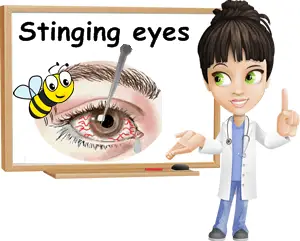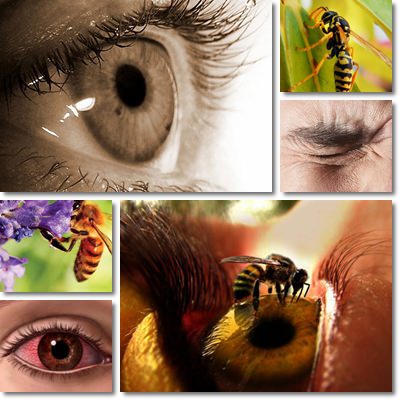Our eyes are one of our most valuable assets. Not only do they help translate the world for us, but they are also the first to introduce us to all things beautiful.
So naturally, any form of eye pain or discomfort, be it itching, burning or stinging has a negative impact on our vision, mindset and general state of health. Moreover, any form of eye pain along with any related symptom is a reason to have our eyes checked by a medical professional.
Stinging sensations in the eye, for example, may be a result of exposing ourselves to draft, but can easily be a sign of a more serious eye condition that requires immediate medical attention and treatment.
However, deciding between causes is something only a trained professional should venture doing. It’s also best to not postpone seeing a doctor or minimize the importance of symptoms because some eye-related conditions are best treated early on.

What exactly is eye stinging?
What does eye stinging actually mean? Eye stinging is not a disease or condition in itself, but rather a symptom of eye pain.
Eye pain that manifests as a stinging sensation is usually not a result of injury or trauma to eye, but may indicate a more serious underlying medical condition, hence the necessity to have our eyes checked if we notice continual eye discomfort or eye pain.
It is important to tell your doctor if the stinging eye sensation is accompanied by other signs or symptoms.
Signs and symptoms there’s something wrong with your eyes
Common signs and symptoms of eye problems include: itching, redness, swelling, burning sensation, secretions and abnormal discharge, pressure, blurred vision, floaters, flashes and minor to severe pain.
Each additional symptom may hold the key to identifying the condition behind the stinging sensation. Flashes, for example, hint at retinal detachment and require an emergency visit to a specialized medical professional for diagnosis and treatment.
What causes stinging eyes?
The causes behind eye stinging are diverse and may range from benign issues that resolve themselves to serious medical conditions that require professional attention and treatments tailored to individual needs. Overall the most common causes for eye stinging include:
- Dry eyes brought on by eye strain, essentially tired eyes, allergies, contact with irritants ranging from makeup and dust to cleaning products, and a number of other causes.
- Eye strain caused by not getting enough sleep, too much screen time, strong light indoors or outdoors, extensive reading and writing (school related, work related).
- Draft from sitting near an open window, using air conditioning, being outside in windy weather.
- Inflammation – localized, primarily affecting the eye area.
- Incorrect prescription for glasses or contact lens or the need for glasses.
- Multipurpose lens solutions.
- Keratoconjunctivitis.
- Allergies (hay fever).
- Tiredness – getting enough sleep.
- Eyelid infection, uveitis, glaucoma.
- Irritants, pollution, dust.
- Sinus problems.

Dry eyes is the most common cause of eye stinging. If our eyes do not produce sufficient tears to help them stay moist, then we may experience discomfort, a sensation similar to having sand in our eyes and even pain in the form of stinging. Straining our eyes by spending too much time in front of a computer or television screen or reading, writing too much causes dryness and discomfort, but can be corrected by resting and using natural artificial tears.
Draft is dangerous not only because it dries out our eyes, but also because it may cause swelling and pain. Any form of inflammation can lead to stinging sensations in the eye as well. Draft, allergies, viral and bacterial infections such as eyelid infections, uveitis or keratoconjunctivitis can all cause stinging eye pain sensations.
Wearing the wrong prescription glasses or contact lens creates pressure and this, in turn, leads to eye pain. Tiredness put a lot of strain on our eyes and may cause discomfort and pain. Some people even report stinging in the eyes after using multipurpose solution for contact lens, possibly due to certain preservatives that may irritate the eyes. Pressure from glaucoma may also result in stinging pain.
Irritants such as smoke, smog, dust or irritants from cleaning products such as soap, shampoo or make-up, chlorine from water, etc. can all lead to stinging sensations. Sinus infections may cause pain that radiates in the eye. Because the causes for eye stinging are so diverse, we have to rely on the professional help of an ophthalmologist or optometrist for diagnosis. Reporting all signs and symptoms to your doctor is imperative for a correct diagnosis.
What is good for stinging eyes?
Treatment for eye stinging should be prescribed by a medical professional following tests to determine the underlying cause. Minimizing eye strain and using artificial tears with a more natural formula should help keep the eyes moist and well. Avoiding draft, checking our glasses or contact lens prescription and changing our multipurpose lens solution may also prove efficient.
Antibiotics eye drops are prescribed for bacterial infections of the eye or sinuses, while allergies are best kept under control with antihistamines or vitamin C taken daily. Resting, staying well hydrated and avoiding inhaling irritant substances also helps. And, more important, see your doctor. Even though eye stinging is not generally a common complaint, or a serious one, it is best to rule out potentially serious conditions that may have negative, long-term effects on vision and eye health.
